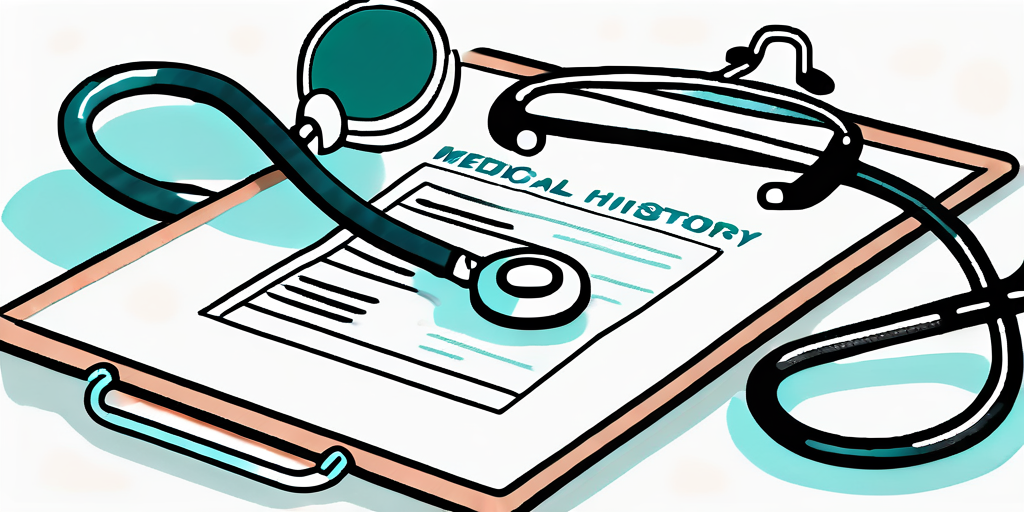A comprehensive medical history plays a crucial role in healthcare, providing healthcare professionals with vital information to make accurate diagnoses, plan appropriate treatments, and deliver personalized care. Understanding the significance of a medical history is essential for both patients and healthcare providers. By examining an individual’s medical history, healthcare professionals can gain valuable insights into their specific health condition, identify potential risk factors, and develop preventive care strategies
Understanding Medical History
The medical history refers to a record of an individual’s past and present health conditions, treatments, and experiences with healthcare providers. It serves as a foundation for healthcare professionals to assess a patient’s medical background, track illnesses or injuries, understand personal and family health trends, and identify underlying factors that might contribute to current health concerns.

Definition of Medical History
A medical history encompasses a vast range of information related to an individual’s health. It typically includes details such as previous and current illnesses, surgeries, allergies, medications, immunizations, family medical history, lifestyle habits, and any ongoing treatment or management plans.
Components of a Comprehensive Medical History
A comprehensive medical history consists of several key components. Initial general information, such as the patient’s name, age, and contact details, serves as the foundation for the medical record. Additional sections may cover personal and family medical histories, focusing on any hereditary diseases or conditions. History of present illness documents details about the primary reason for the patient seeking medical care.
Moreover, the medical history also includes information about previous surgeries, hospitalizations, and medication usage. Allergies and adverse reactions, such as allergies to medications or environmental factors, are crucial to note, as they can significantly impact treatment plans. Immunization history helps healthcare professionals ensure their patients are appropriately protected against preventable diseases.
Furthermore, it is important to consider the social and environmental factors that can influence an individual’s health. For example, a comprehensive medical history should encompass lifestyle factors, such as smoking, alcohol consumption, exercise habits, and diet preferences. These details aid in determining specific risk factors and forming tailored approaches to preventive care.
Additionally, mental health history plays a significant role in understanding a patient’s overall well-being. It includes information about any previous or ongoing mental health conditions, such as anxiety or depression, as well as any treatments or therapies received. Recognizing the interconnectedness of physical and mental health is essential for providing comprehensive and holistic care.
In conclusion, a comprehensive medical history is a vital tool for healthcare professionals to gather essential information about a patient’s health. By considering various components, including personal and family medical histories, lifestyle factors, immunization records, and mental health history, healthcare providers can develop a more complete understanding of a patient’s health status and make informed decisions regarding their care.
The Role of Medical History in Diagnosis
Medical history plays a vital role in the diagnostic process. By reviewing a patient’s medical history alongside their reported symptoms, healthcare professionals can analyze patterns and draw connections to identify potential underlying conditions.
Moreover, delving into a patient’s medical history can unveil crucial details that might not be immediately apparent. Factors such as past surgeries, allergies, or previous treatments can significantly impact the current health status of an individual. This comprehensive approach to medical history-taking ensures that no stone is left unturned in the pursuit of an accurate diagnosis.
Medical History and Symptom Analysis
Medical history provides valuable context when evaluating symptoms. Certain illnesses or conditions may have specific symptoms that can be linked to previous medical conditions or family history. By understanding a patient’s medical history, healthcare providers can expedite the diagnostic process and develop targeted investigations.
Furthermore, the timeline of symptom onset in relation to past medical events can offer valuable insights. For instance, a recent history of travel to a malaria-endemic region may drastically alter the differential diagnosis for a patient presenting with fever and chills. This intricate interplay between medical history and symptom analysis showcases the importance of a thorough and meticulous approach to patient care.
Medical History in Identifying Risk Factors
A comprehensive medical history aids in identifying potential risk factors for various health conditions. For example, a family history of heart disease or diabetes can indicate an increased predisposition to these diseases. This information allows healthcare professionals to implement preventive measures and tailor treatment plans accordingly.
Moreover, understanding the social determinants of health embedded within a patient’s medical history is paramount. Factors such as socioeconomic status, access to healthcare, and lifestyle choices can all influence an individual’s health outcomes. By recognizing and addressing these underlying determinants, healthcare providers can offer holistic and patient-centered care that extends beyond the confines of a singular diagnosis.
Medical History in Treatment Planning
Medical history significantly influences the treatment planning process. Understanding a patient’s medical history ensures healthcare professionals can make informed decisions regarding the most appropriate treatment options for each individual.

When delving into a patient’s medical history, healthcare providers uncover a wealth of information that goes beyond just listing past illnesses. Factors such as family medical history, lifestyle choices, and genetic predispositions all play a crucial role in shaping an individual’s health profile. By considering these aspects, healthcare professionals can tailor treatment plans that not only address current issues but also work towards preventing future health complications.
How Medical History Influences Treatment Choices
Medical history provides critical insights into a patient’s response to previous treatments and medications. It helps healthcare professionals identify effective therapies and avoid potentially harmful treatments. Additionally, knowledge of previous surgeries, allergies, or adverse reactions enables healthcare providers to make informed decisions and prevent complications.
Moreover, a comprehensive medical history allows healthcare professionals to take a holistic approach to treatment. By understanding the underlying health conditions and risk factors present in a patient’s history, healthcare providers can develop personalized treatment strategies that consider the individual’s unique needs and circumstances. This personalized approach not only enhances the effectiveness of treatment but also fosters a stronger patient-provider relationship built on trust and collaboration.
Medical History and Medication Management
Understanding a patient’s medical history is crucial for safe and efficient medication management. By reviewing previous medications and allergies, healthcare professionals can prescribe appropriate medications and avoid adverse drug reactions. Medical history also plays a role in dosage adjustments and drug interactions, ensuring optimal treatment outcomes.
Furthermore, a detailed medical history aids in identifying potential red flags that may impact medication efficacy. Factors such as non-compliance with previous treatments, underlying health conditions, and lifestyle habits can all influence how a patient responds to medication. By taking these factors into account, healthcare professionals can proactively address any barriers to successful treatment adherence and adjust medication plans accordingly to maximize therapeutic benefits.
The Impact of Medical History on Preventive Care
Medical history significantly influences the provision of preventive care. By understanding a patient’s medical history, healthcare professionals can develop tailored preventive care strategies and implement appropriate screening measures.

Delving deeper into a patient’s medical history unveils a wealth of information that can shape the course of preventive care. Factors such as past illnesses, surgeries, medications, and allergies play a crucial role in guiding healthcare providers towards the most effective preventive interventions.
Medical History in Screening and Early Detection
Medical history helps determine the need for specific screenings or tests based on an individual’s risk factors. For example, if a patient has a family history of certain cancers, healthcare professionals may recommend earlier or more frequent screenings to promote early detection.
Moreover, a comprehensive medical history enables healthcare providers to identify red flags that may warrant further investigation. By recognizing patterns or trends in a patient’s medical background, healthcare professionals can proactively address potential health risks and intervene promptly.
Lifestyle Recommendations Based on Medical History
Medical history, including lifestyle factors, allows healthcare providers to make personalized recommendations to optimize a patient’s health. For instance, if an individual has a history of cardiovascular disease, healthcare professionals may advise lifestyle modifications such as adopting a heart-healthy diet, engaging in regular exercise, and quitting smoking.
Furthermore, understanding a patient’s medical history empowers healthcare providers to offer tailored guidance on preventive measures beyond traditional screenings. By considering past medical experiences and lifestyle choices, healthcare professionals can collaborate with patients to develop holistic strategies that encompass both physical and mental well-being.
Confidentiality and Ethical Considerations in Medical History
Patient confidentiality and ethical considerations are of paramount importance when dealing with medical history. Healthcare professionals must respect patient rights and handle medical information ethically and responsibly.
Patient Rights and Medical History
Patients have the right to privacy and confidentiality regarding their medical history. Healthcare professionals must obtain informed consent before accessing or sharing medical information and ensure its secure storage and appropriate use. Respecting patient rights fosters trust between patients and healthcare providers, improving the quality of care.
Ethical Use of Medical History Information
Healthcare professionals should handle medical history information ethically and avoid discrimination or stigmatization based on an individual’s medical background. Medical history should be used to enhance care, rather than to exclude or disadvantage patients. Ethical considerations govern the responsible use of medical history information to ensure fair and equitable treatment for all individuals.
In conclusion, a comprehensive medical history is an essential tool in healthcare. It aids in diagnosis, treatment planning, preventive care, and ensures ethical patient care. By understanding the importance of a medical history, patients and healthcare professionals can work collectively to achieve better health outcomes.




